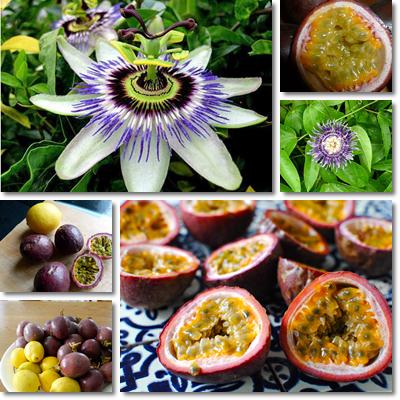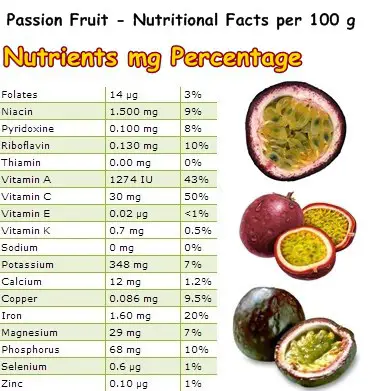Sweet, juicy and seedy, passion fruit are highly appreciated both for their unique, tropical aroma and for the wonderful health benefits they bring. Passion fruit (or Passiflora edulis) are native to the eastern and southern regions of South America, but nowadays have come to be cultivated extensively in numerous other countries.
They are nutritious fruits and important dietary sources of vitamin A, vitamin C, several B vitamins, iron and phosphorus, not to mention impressive amounts of dietary fiber for digestive health.
The fruits are usually round and may differ in colour and size depending on the variety. The most common varieties are the purple passion fruit, the size of a lime and has a dark purple exterior when ripe, and the golden passion fruit, which is the size of a giant orange and has a yellow skin. Both varieties are very juicy, seedy and extremely delicious. What is more, they provide important nutrition: vitamins, minerals and phytochemicals with great health benefits.

First of all, passion fruit a great source of dietary fiber which makes it one of the greatest ally in the fight against constipation.
Because of their great high fiber content (over 10 g of fiber per 100 g of fresh fruit), eating passion fruit helps cleanse the intestines, protect the colon from overexposure to toxins in waste and partially prevent the absorption of cholesterol at the intestinal level, with benefits for blood cholesterol numbers.
Fiber is further important for digestive health as it represents a source of nourishment for good gut bacteria. And because of its constipation-relieving effect, it is a good food to eat for hemorrhoids.
Consuming passion fruit regularly is sure to have some wonderful effects on your health. Passion fruit is also incredibly sweet due to a high natural sugar content. This is why the fruit is a preferred choice in many desserts. At the same time, it’s not an ideal choice for diabetes as diabetics are advised to avoid anything that is too high in sugar. And even though it makes a wonderful juice because of its tropical, fruity, juicy pulp and natural sweetness, it’s best avoided if you have diabetes.

Passion fruit is a great source of vitamin C, an amazing natural immune system booster. What vitamin C does is help our body develop resistance to a growing number of infectious agents. It is also a potent anti-inflammatory which is why passion fruits carry out a strong anti-inflammatory action within our body. Very important: as you may have read, inflammation is believed to be one of the main causes leading to cancer, so make sure you eat plenty of foods with anti-inflammatory components.
Only 100 g of passion fruit can also provide us with almost half of the recommended daily intake of vitamin A, a nutrient pivotal for a healthy vision and can improve night vision in particular. Also, the main vitamin A precursor found in passion fruit, beta-carotene, has potent antioxidant effects, protecting our eyesight from free radicals found in blue light waves. Even more, the nutrient is the prerequisite for healthy skin and mucous membranes. Both vitamin A and vitamin C help the body adequately store and use vitamin D, which we receive from exposure to sunlight.

Passion fruit have generous amounts of potassium, an essential dietary mineral and electrolyte which regulates body fluids as well as blood pressure and heart rate. The potassium in the fruit helps counteract the effects of excess sodium and prevent symptoms of water retention, such as swollen legs, bloated abdomen or puffy eyes and face. The fruit contain decent amounts of iron as well. An adequate intake helps both prevent and manage anemia and muscle weakness, combat fatigue and restore vitality. Last but not least, it provides small, yet important amounts of B vitamins, notably vitamins B2, B3 and B6. Read about vitamins and minerals, their roles and importance in the human body on the vitamins and minerals page.
Conclusion
The average life span of passion fruit plants is of around 7 years. Passion fruit plants thrive in loamy, sandy soils, sunny gardens and love to be watered often. The fruit grows on vines and changes colour as it ripens. The flower, known as passion flower, is somewhat eerie: despite its beautiful, rich colors, it has weird, alien-like features, making the plant even more bizarre. Nonetheless, the fruit is an absolute tropical delight. Overall, passion fruit are extremely health-friendly and consumption is wholeheartedly recommended, provided you enjoy the fruit’s unique flavor.

